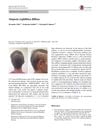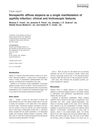20 citations,
March 2019 in “Case Reports in Dermatology” IL-17 inhibitors for psoriasis may cause unexpected hair loss.
 2 citations,
January 2017 in “Clinical and medical investigations”
2 citations,
January 2017 in “Clinical and medical investigations” Herbal lotions are effective for severe hair loss, with a 64.8% success rate, but relapse is common and long-term management requires allergen control and possible corticosteroid use.
 11 citations,
May 2009 in “Actas Dermo-Sifiliográficas”
11 citations,
May 2009 in “Actas Dermo-Sifiliográficas” Some treatments can help hair regrowth in alopecia areata, but none offer a cure, and effectiveness varies.
 14 citations,
January 1985 in “International Journal of Dermatology”
14 citations,
January 1985 in “International Journal of Dermatology” The cause of alopecia areata was unknown, and while various treatments existed, no best treatment was agreed upon.
 8 citations,
January 2003 in “Pharmacotherapy: The Journal of Human Pharmacology and Drug Therapy”
8 citations,
January 2003 in “Pharmacotherapy: The Journal of Human Pharmacology and Drug Therapy” Chemotherapy may cause recurring hair loss due to an autoimmune response.
 1 citations,
May 2023 in “Prospects in Pharmaceutical Sciences”
1 citations,
May 2023 in “Prospects in Pharmaceutical Sciences” New cytokine-targeted therapies show promise for treating alopecia areata.
 February 2024 in “Curēus”
February 2024 in “Curēus” Secukinumab can cause hair loss, which may improve after stopping the medication.
26 citations,
January 2018 in “Skin appendage disorders” Thallium, mercury, selenium, and colchicine strongly cause hair loss.
 November 2023 in “Clinical, Cosmetic and Investigational Dermatology”
November 2023 in “Clinical, Cosmetic and Investigational Dermatology” Saw palmetto extract reduced hair loss and improved hair growth in people with hair thinning.
 3 citations,
May 2002 in “Therapeutische Umschau”
3 citations,
May 2002 in “Therapeutische Umschau” The document concluded that cyproterone acetate and minoxidil are effective for female hair loss, and a supportive doctor-patient relationship is important.
 August 2021 in “EMC - AKOS - Trattato di Medicina”
August 2021 in “EMC - AKOS - Trattato di Medicina” Acquired alopecia is hair loss that can be reversible or irreversible, depending on whether the hair follicle is destroyed.
 36 citations,
January 2010 in “Human & experimental toxicology”
36 citations,
January 2010 in “Human & experimental toxicology” Eating paradise nuts led to selenium poisoning, causing nausea, hair loss, and other symptoms in two women.
 January 2024 in “Inflammation and regeneration”
January 2024 in “Inflammation and regeneration” Th22 cells are essential for Tβ15-induced hair growth in mice.
 6 citations,
April 2015 in “Infection”
6 citations,
April 2015 in “Infection” Treatment with benzylpenicillin and prednisolone cured the patient's syphilis and hair loss.
 18 citations,
January 2014 in “Postępy Dermatologii i Alergologii”
18 citations,
January 2014 in “Postępy Dermatologii i Alergologii” Personalized treatment plans are important for people with alopecia areata.
 421 citations,
April 2012 in “The New England Journal of Medicine”
421 citations,
April 2012 in “The New England Journal of Medicine” Alopecia Areata is an autoimmune condition causing hair loss with no cure and treatments that often don't work well.
 7 citations,
January 2018 in “International Journal of Dermatology”
7 citations,
January 2018 in “International Journal of Dermatology” Syphilis can cause hair loss without other symptoms and should be considered when diagnosing unexplained hair loss.
 15 citations,
January 2020 in “Experimental Dermatology”
15 citations,
January 2020 in “Experimental Dermatology” The document concludes that understanding and treatments for alopecia areata have significantly advanced, now recognizing it as an autoimmune disorder.
 73 citations,
March 2009 in “Seminars in Cutaneous Medicine and Surgery”
73 citations,
March 2009 in “Seminars in Cutaneous Medicine and Surgery” The document concludes that accurate diagnosis of hair disorders is crucial and requires a range of diagnostic methods.
 30 citations,
May 2004 in “Journal der Deutschen Dermatologischen Gesellschaft”
30 citations,
May 2004 in “Journal der Deutschen Dermatologischen Gesellschaft” The document concludes that early diagnosis and treatment are crucial for children with hair loss to prevent permanent damage, although not all conditions can be effectively treated.
 10 citations,
February 2011 in “Journal der Deutschen Dermatologischen Gesellschaft”
10 citations,
February 2011 in “Journal der Deutschen Dermatologischen Gesellschaft” The document concludes that proper diagnosis and evidence-based treatments are crucial for managing hair diseases, and psychological support for patients is important.
 24 citations,
May 2010 in “Hautarzt”
24 citations,
May 2010 in “Hautarzt” Different hormones affect hair growth and conditions, with some causing hair loss and others promoting it.
 21 citations,
May 2016 in “The Cochrane library”
21 citations,
May 2016 in “The Cochrane library” Topical minoxidil helps treat female pattern hair loss, but more research needed for other treatments.
 23 citations,
January 2020 in “Central-European Journal of Immunology/Central European Journal of Immunology”
23 citations,
January 2020 in “Central-European Journal of Immunology/Central European Journal of Immunology” Alopecia areata, a type of hair loss, is likely an autoimmune disease with a genetic link, but its exact cause is still unknown.
 19 citations,
January 2018
19 citations,
January 2018 Most people with alopecia areata have nail changes, which are common but don't greatly affect their quality of life.
 5 citations,
June 1994 in “Journal of Cutaneous Pathology”
5 citations,
June 1994 in “Journal of Cutaneous Pathology” No CD44 in alopecia areata, present in normal and androgenetic alopecia.
 7 citations,
October 2019 in “Evidence-based Complementary and Alternative Medicine”
7 citations,
October 2019 in “Evidence-based Complementary and Alternative Medicine” Chinese medicine may help hair growth and reduce hair loss in androgenetic alopecia.
 15 citations,
July 1999 in “Dermatologic Clinics”
15 citations,
July 1999 in “Dermatologic Clinics” The document concludes that immune system abnormalities cause alopecia areata, but the exact process is still not completely understood.
 2 citations,
November 2022 in “BioMed Research International”
2 citations,
November 2022 in “BioMed Research International” Baicalin may help treat hair loss by promoting hair follicle growth and activating specific cellular pathways.
 December 2024 in “IntechOpen eBooks”
December 2024 in “IntechOpen eBooks” Trichoscopy helps diagnose and track alopecia areata by examining specific hair and scalp markers.



























